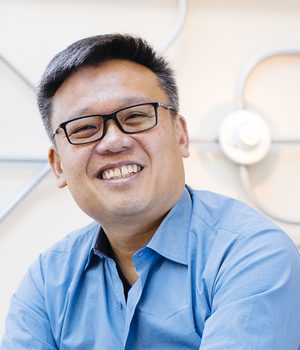Engineered Cells: The Medicines of Tomorrow
I4) Engineered Cells: The Medicines of Tomorrow
DOWNLOADABLE GUIDE TO SUNDAY EVENTS
With the much-heralded success of the modified immune cells known as CAR-T cells in the treatment of leukemia, we’re growing accustomed to the idea that, in very limited circumstances, human cells can be redesigned to fight disease.
But Wendell Lim, director of the UCSF Center for Systems and Synthetic Biology, has grander ambitions: rather than engineer T cells to do better what they already do naturally—find and attack diseased cells—Lim is programming them to do a whole lot more. By repurposing an evolutionarily ancient protein called Notch, Lim has created a modular, customizable system that allows T cells to find any type of cell in the body and then execute a wide range of possible responses. His work promises a limitless palette of bespoke T cells with unique sensing and activating profiles. Once injected, these cells could precisely target cancer while sparing normal tissue; they could find damaged tissue in any organ and directly deliver a cargo of regenerative proteins; their potency inside the body could be dialed up or down at will by doctors, using drug molecules as a sort of cellular “remote control.”
As founder of Cell Design Labs, Lim is bringing innovative cell therapies like these closer to everyday clinical reality. “Ten years ago, people thought engineering cells was just science fiction. People didn’t even understand why we would want to do it,” says Lim, a Howard Hughes Medical Institute Investigator and professor and chair of UCSF’s Department of Cellular and Molecular Pharmacology. “No one is saying that now.”

